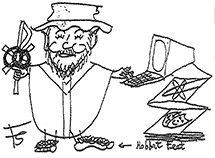More about Up and Down.
In the heyday of Tupperware, we had on our shelf two big boxes: “Bottomless Tops” and “Topless Bottoms”. Thus economy was served and humour retained. But Up and Down and their inter-connections remain mysteries in various ways.
Two sciences we have not mentioned before are neurology and psychiatry;
maybe, one a science, the other an art. In any case we all know what it is to be elated or depressed, and that some people are given “uppers” and ”downers” to relieve or intensify these conditions. Whether it is a case of mild neurosis (“nerves”) or severe psychosis (”really sick”) may seem to be a matter of degree.
I think that while Up and Down is very descriptive in ordinary speech, “simple” or “complex” may tell us more. The idea of complexity is very important in science. The world is very complicated, whether you are looking at tiny particles smaller than atoms, or big spaces such as cosmic space-time and “light-years.” And “information” seems to be just as much a reality whether it is found in the complexity of the universe, or in the apparent simplicity of a creed.
Many religious people yearn for simplicity. “Just give me the simplicity of the Gospel.” “Lord, I just want follow your simple Word!” The scientists would like that, too: if only they could find a unified theory of everything … what a rosy life. In the meantime they try to find simplicity by getting vast outlays in money and paper, effort and computer information, and a whole brother/sister-hood is given over to spending billions on huge contraptions, miles in diameter, to capture another tiny ”particle” - which will simplify everything and forge a ‘unified theory.’
Gulliver would have interesting travels today!
Perhaps the modern Gulliver was Kurt Gödel, who realized that the unified self-consistent system was impossible, and provided a model in math with implications -or inferences - for philosophy. In a sense he was stretched out and pinned down by his own brilliance, or why else would a man starve himself to death?
Religion is not simple because the world is not simple.
Mike Higton has written a book called “Difficult Gospel, The Theology of Rowan Williams.” (2004) Rowan Williams is the Archbishop of Canterbury, a human being, married, with children, has published poetry, and writes and gives speeches, and tries to spread peace and love among Anglicans and many others.
Higton says: “The real difficulty, the deep, disturbing challenge of the Gospel is inherent, it is unavoidable. If we do not hear that difficulty, we have not heard the Gospel.”
Religious faith may unify your life, may exalt you. In the world as it is, and has been with human beings, there is a cross to be carried: Gödel had his cross, Rowan Williams has his. No two people carry the same cross, nor react the same way to their grief, or their exaltation. Why? Because the One, whom we thought was Up, comes Down within this life to its very dregs, and in doing so, makes discernible the pattern for us. Our lives are in tension between being on fire to innovate, and learning to “let be.” Or, being stretched between Up and Down.

